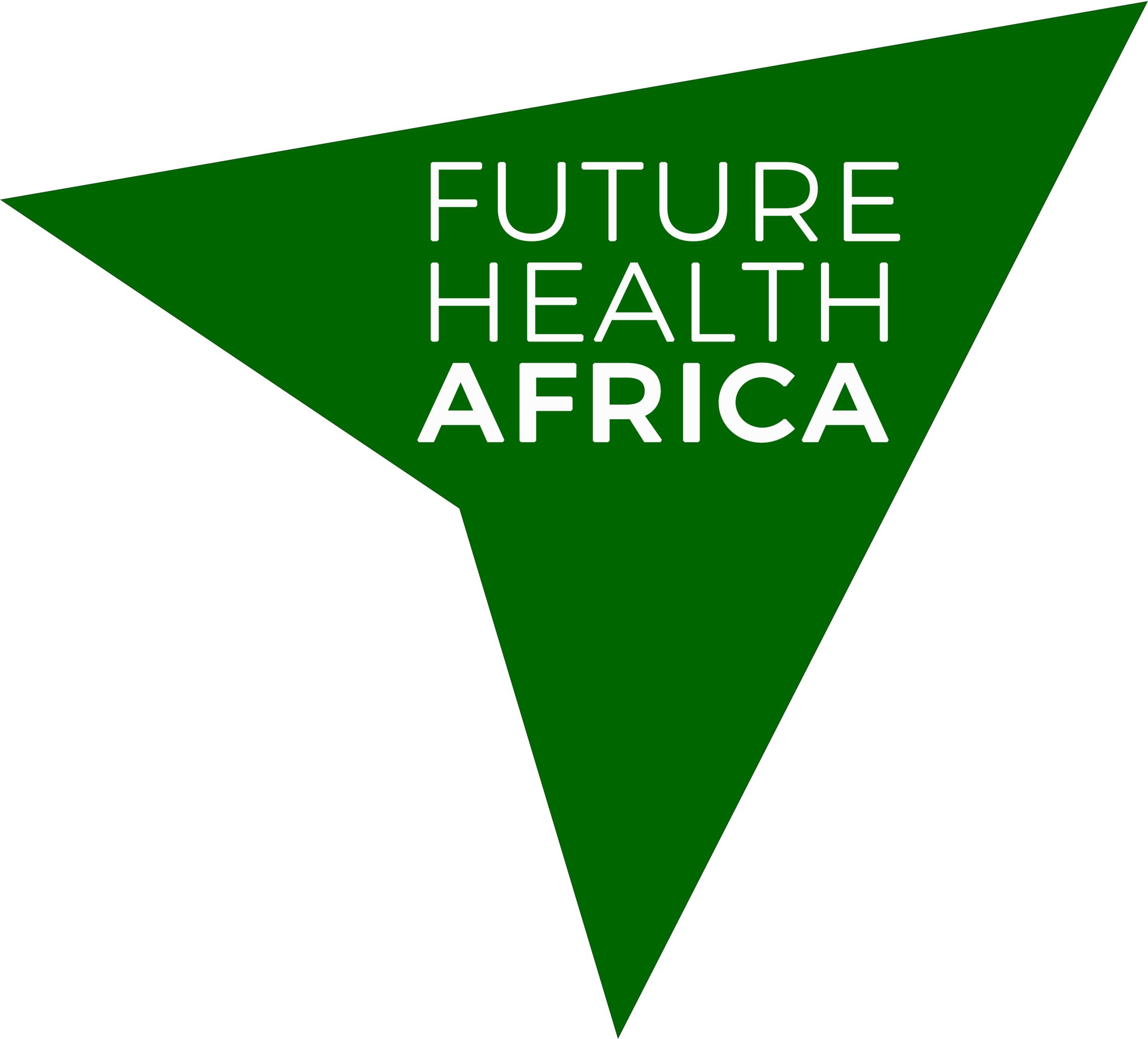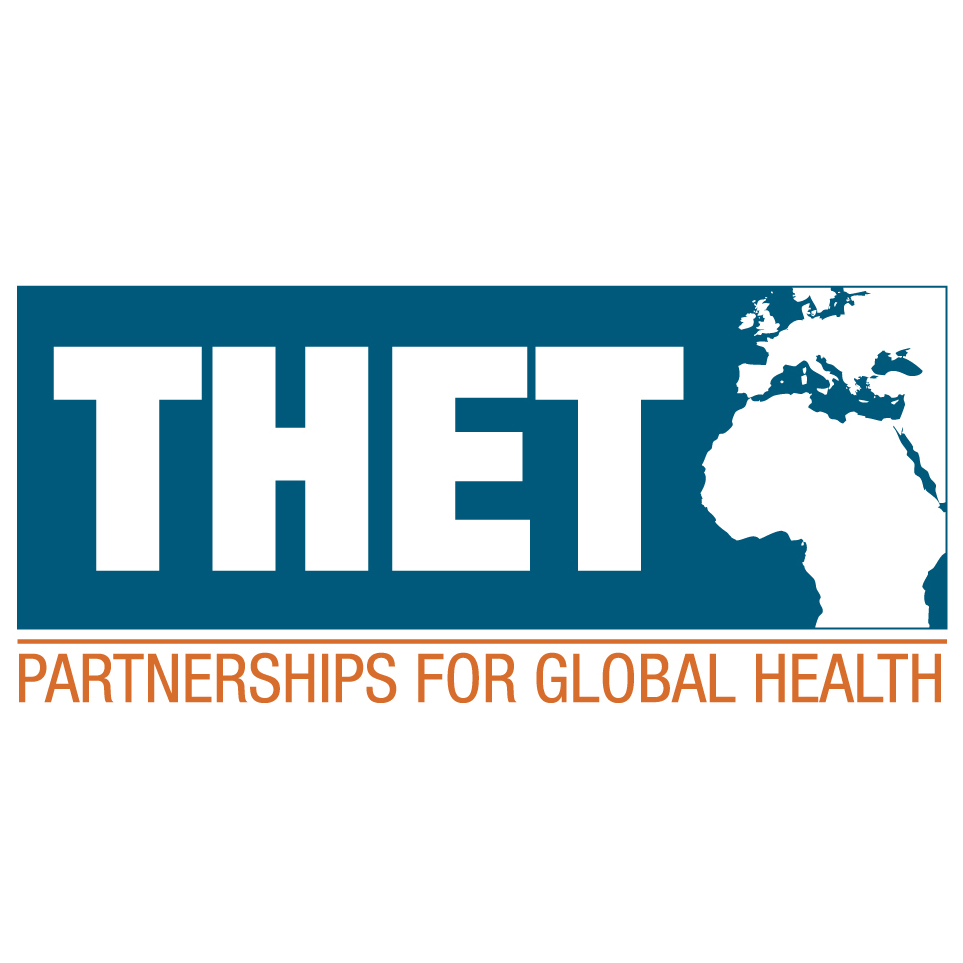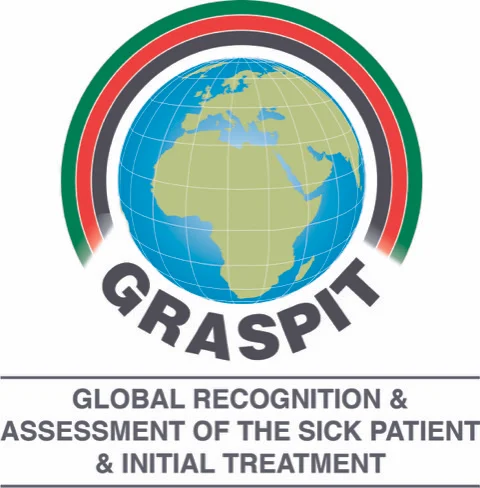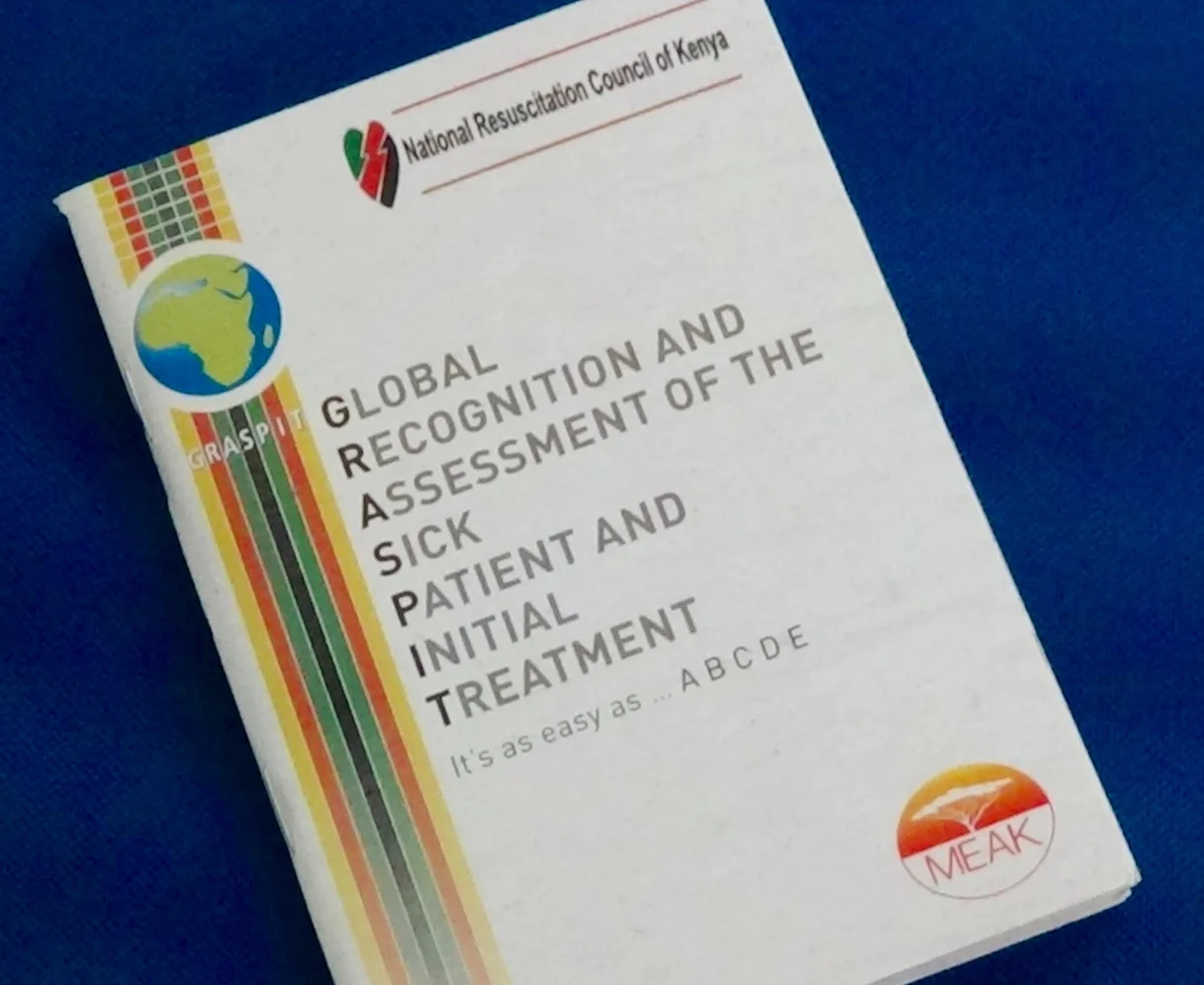future health africa:
GRASPIT
OVERVIEW / OUR TEAM & PARTNERS / our courses / centres / case studies / ISPEAK 2016 / EMAIL US
OVERVIEW
GLOBAL RECOGNITION OF THE ACUTELY SICK PATIENT AND INITIAL TREATMENT
GRASPIT is a tool that equips clinicians with a structured systematic approach to the management of the deteriorating acutely ill patient. GRASPIT has been shown to increase a clinician’s confidence in the management of these challenging patients.
The four key principles of GRASPIT are:
Early recognition of deteriorating acutely ill patients
Systematic approach to the assessment of patients
Early initial treatment
Team working through effective communication
Background
The GRASPIT Course is delivered as a combination of lectures and scenario-based training using simple equipment available in the workplace. Course development commenced in 2010 and has subsequently been introduced into a number of Kenyan institutions. The Course was accredited by the National Resuscitation Council of Kenya (NRCK) in 2012.
Who is GRASPIT for?
The GRASPIT course is designed for delivery to a multidisciplinary audience whether they are junior or senior in experience. As it addresses the fundamentals of care, it is appropriate for all specialties and staff working with either adults or children.
What challenges does it address?
Failure to recognise the deteriorating acutely ill patient is well recognised as a significant risk factor for a poor outcome. When reviewing these cases two consistent themes emerge; either the failure to take and record appropriate observations and / or a failure to recognise abnormal vital signs as a trigger for timely action. In addition, it was noted that an inconsistent approach to assessment and treatment and poor team working were often significant contributing factors. GRASPIT was designed to address these challenges through promoting a systematic approach to the assessment and treatment of acutely unwell patients in Kenyan hospitals.
What is included in the course?
The principles of the course were taken from others used internationally to address similar challenges (e.g. ALERT, Acute Life-Threatening Events Recognition and Treatment and SOS, Stabilisation of the Sick developed in the UK). In addition, GRASPIT’s pilot courses were refined in the light of feedback received from Kenyan staff.
GRASPIT one day course delivered through a combination of lectures and scenario based training. An important component of the course is introducing an effective communication tool; SBAR+ (Situation Background Assessment Recommendation plus) in order to facilitate effective team working.
What are the wider benefits of GRASPIT?
GRASPIT represents one aspect of a system wide quality improvement approach to improving patient care. If its principals are adopted and consistently applied, it results in significant improvements to patient care and consequent enhancements to the professional lives of the trained healthcare providers.
Training with simulators, Kajiado Hospital
The GRASPIT Team, 2013
KENYA-BASED TEAM
Christine Musee - Monitoring & Evaluation Lead
Christine is nurse manager working at Kenyatta National Hospital in Kenya. She has diverse interests and skills including Leadership & Governance, Research, Quality Improvement, Monitoring & Evaluation, Training, Mentorship and Coaching. She is the Monitoring and Evaluation lead for Springboard’s sister programme GRASPIT which she helped move from UK-led to entirely Kenyan-delivered. She trains Research, Quality Improvement, Leadership & Governance, Lifestyle skills, BLS, ACLS, ETAT+, GRASPIT. Christine also acts as a mentor and spokesperson in her community, successfully balancing her roles as a wife, mother, Christian leader and writer/author. She is energetic and is passionate about promoting effective communication and documentation both in her workplace and in her community. q4a is delighted to welcome her as the first Kenyan faculty member on the Springboard Advanced (Leadership) course.
Kiruja Jason Gitonga - GRASPIT Training Coordinator
BSC Nursing and MSC Health Systems Management, with interests in quality improvement.
Kiruja’s role includes:
Liaising with County hospitals in scheduling of GRASPIT courses
Having a faculty team ready for training in County hospitals
Building effective team work among the GRASPIT team of facilitators
Recruiting new GRASPIT facilitators and champions form the county hospitals
Mentoring new facilitators and champions into competent facilitators
Continuously reviewing the training content and make sure it is up to date
Providing innovative ways of continuously improving the GRASPIT Course
Writing reports on the course in the County hospitals
UK-BASED TEAM
Matthew Halkes - UK Project Lead
Dr Matt Halkes is a consultant anaesthetist at Torbay Hospital and working with Kenyan and UK colleagues has coordinated the development of GRASPIT since its inception. His interests are innovation, digital healthcare and workforce development.
Founding Members of UK Faculty
Kerri Jones
Hazel Robinson
Contributing Kenyan Faculty
Bhavin Patel
Michael Swart - UK Core Faculty
Consultant in Anaesthesia, Intensive Care and Perioperative Medicine at Torbay Hospital, Devon, UK. Mike is involved in Anaesthesia for the Orthopaedic Project, delivering the primary Trauma Course and is co-developer of the Global Recognition and Initial Treatment of the Sick Patient - GRASPIT.
GRASPIT Volunteers
Dr Holly Eadsforth
Dr Craig Miller
Dr Mary Ibeto
Ellie Forbes - UK Core Faculty
Ellie is Senior Lecturer for Children’s Nursing at the University of Lincoln. She became involved with GRASPIT in Jan 2013 whilst Matron for Child Health at Torbay Hospital. Ellie added the paediatric component to GRASPIT and was Education Lead for the charity between 2013 and 2017.
Previous Long-Term Volunteers
Katy Vidler
Lizzie Troy
Ellie Gregory
OUR PARTNERS
The following organisations are vital in the successful delivery of our work:
Medical and Educational Aid in Kenya (MEAK)
A charity that organizes and funds medical and surgical missions to Kenya in the fields of paediatric cardiac surgery, thoracic surgery, ophthalmology and orthopaedics.
National Resuscitation Council of Kenya (NRCK)
NRCK has a role in the production and adoption of national clinical guidelines. It provided logistical and administrative support for a portfolio of acute care course including faculty development. GRASPIT is accredited by the National Resuscitation Council of Kenya.
https://m.facebook.com/National-resuscitation-Council-of-Kenya
For donations to GRASPIT you can donate using kind link at https://donate.kindlink.com/Future-Health-Africa/5219
Tropical Health and Education Trust (THET)
A UK based Trust that uses Health Partnerships as a process of supporting local communities and Ministries of Health in Africa.
THET successfully won the bid to manage the Health Partnership Scheme (HPS) in 2010, a programme funded by the UK Department for International Development (DFID). The scheme aims to improve health outcomes for poor people in DFID priority and other low income countries by supporting health partnerships to deliver projects aimed at improving the skills and education of health workers. GRASPIT has been successful in securing a grant from the HPS programme.
OUR COURSES
GRASPIT
Target Audience
The GRASPIT course is designed for delivery to a multidisciplinary audience whether they are junior or senior in experience. As it addresses the fundamentals of care, it is appropriate for all specialties and staff working with either adults or children.
Course Format
The GRASPIT Course is designed as a 1 day training course delivered through a combination of lectures and interactive scenario based training. Alternatively, it can be delivered through a combination of shorter sessions.
The interventions taught are often relatively simple in nature (basic airway management, oxygen therapy, intravenous fluids) utilising the equipment that is readily available in the clinical environment.
Effective communication is promoted through the demonstration of the SBAR+ (Situation Background Assessment Recommendation plus) tool.
Requirements
The GRASPIT Course Organisers Manual provides information on organising a course and provides information on supporting resources and material. Experience to date shows that all these resources are readily available in Kenyan health facilities.
Links to training materials
GRASPIT Course Organisers Manual (pdf 3mb)
Course Participant Manual (pdf 5.1mb)
GRASPIT Poster (pdf 1.1mb)
Train the Trainer
Aim of GRASPIT Train the Trainers Course
For the GRASPIT course to be sustainable and widely disseminated, it is important that Kenyan medical and nursing staff become confident in taking on the delivery of this teaching. The aims of the GRASPIT Train the Trainer course are to:
reinforce the key principles of the GRASPIT course
review the course material
introduce the basic concepts of adult education
provide practical advice on delivering teaching sessions
Identifying potential trainers
An important outcome of each GRASPIT course is to identify, from amongst those attending, potential future GRASPIT trainers. They can then be invited to attend a GRASPIT Training of Trainers course and help form a local faculty which can then deliver further courses. Ideally several members of staff from a hospital or clinic would be trained as instructors.
Alternatively, trainers from a group of hospitals or clinics may decide to form a local network and deliver courses together at a central location or rotate the delivery around the different sites.
The local trainers will receive support and guidance from experienced Kenyan trainers and from the GRASPIT training coordinator.
Course format
The Training of Trainers course is also a 1 day training. This day is usually preceded by the new trainer attending a GRASPIT course and followed by the trainers facilitating their first GRASPIT Course. So, over the course of 3 days an individual can attend their first GRASPIT Course (day 1), be trained as a trainer (day 2), and then facilitate their first GRASPIT course (day 3).
The Training of Trainers Course is supported by an accompanying slide set and a GRASPIT Train the Trainers Course Manual. This material will be of particular value to those who have little or no experience in teaching but may also be useful to experienced teachers as well. An accompanying GRASPIT Course Organisers Manual also provides information on organising a course and provides information on supporting resources and material.
Links to training material for GRASPIT Training of Trainers
GRASPIT Course Organisers Manual (pdf 3mb)
GRASPIT Train the Trainers Manual (pdf 2.3mb)
OUR CENTRES
Nanyuki Teaching & Referral Hospital
Contact: Grace Mugwik: gracemugwika@yahoo.com
Nanyuki’s GRASPIT faculty now have plans to have at least 90% of its healthcare workers GRASPIT trained by the second quarter of 2017. They also have plans to offer GRASPIT training to its peripheral health facilities.
By providing GRASPIT training to the peripheral sites they aim to improve the quality of initial treatment patients receive before transfer, improve communication when patients are referred and consequently reduce in hospital stay and mortality.
Those that has completed GRASPIT training at Nanyuki report “improved health care provision attributable to GRASPIT training as the biggest motivation” for continuing their practice of the GRASPIT principles.
Nyahururu District Hospital
Contact: Sheila Maina: katmd13@gmail.com
Nanyuki sister hospital in Lakaipia County, has recently recommenced GRASPIT training supported through County funding.
Successfully completed GRASPIT training for over 80 of its healthcare workers by end of 2016 and have run trainings in their referral sites.
They report seeing a decrease in the number of maternal referrals after GRASPIT training was held at its referral centres.
Watch Nyahururu’s GRASPIT Story (presented at iSPEAK Conference 2016)
Coast Province General Hospital, Mombasa
Contact: James Maina jamesonchonga74@yahoo.com
Alongside Nanyuki, CPGH was a development site for GRASPIT Course. Through the THET Health Partnership Scheme funding has been identified for a Train the Trainers Course which is hoped to be delivered in the near future.
Mombasa Hospital & Bomu Hospital
Contacts:
Mombasa Hospital: Nelson Mandela: oanelmanat@gmail.com
Bomu Hospital: Dr Nashina nashina.admani@bomuhospital.org
Both these hospitals have received a train the trainers course with the aim of developing their local faculty.
Kenyatta National Hospital
Contact: Christine Musee: christinemusee@gmail.com
Starting in 2012, GRASPIT training is now well embedded in Kenyatta with over 700 members of staff trained. Led by the GRASPIT Monitoring & Evaluation and Training Coordinator Leads, they have a core faculty of approximately 15 trainers who provide the support of the introduction of GRASPIT into other institutions.
Kisumu County Hospital
Contact: Suzanne Obudo: suzanneobudo@gmail.com
In 2014, funding was sourced through a THET Health Partnership Grant for the introduction of GRASPIT to 4 new institutions including Kisumu. Based on a needs analysis, these hospitals were selected and have now received GRASPIT and Training of Trainer Courses and they are now delivering training independently.
Since its first GRASPIT training in March of 2016, Kisumu County Hospital has gone from strength to strength in its efforts to grow and sustain the programme. Within just its first year with the GRASPIT programme nearly 200 staff completed GRASPIT training and 20 GRASPIT Trainers were developed. These achievements can be directly attributed to the persisted enthusiasm and dedication of Kisumu County Hospital’s staff and management.
In November of 2016, Kisumu County Ministry of Health formally acknowledged the GRASPIT programme and its impact on its county by agreeing to fund the programme for the following year.
Kisumu County continues to be a beacon and pioneer as it strides to improve the quality of care provided to its patients. Plans for Kisumu County to house one of the 1st Centres (outside of Kenyetta National Hospital) that has its own GRASPIT Master Trainers are well underway.
Nyeri District Hospital
Contact: Julie Ituku: juliegituku@gmail.com
In 2014, funding was sourced through a THET Health Partnership Grant for the introduction of GRASPIT to 4 new institutions including Nyeri District Hospital. Based on a needs analysis, these hospitals were selected and have now received GRASPIT and Training of Trainer Courses and they are now delivering training independently.Successfully GRASPIT trained approximately of its 100 healthcare workers and developed approximately 20 GRASPIT Trainers.
Nyeri’s healthcare workers report that the skills obtained from GRASPIT training has “improved healthcare delivery” and “built the confidence of their healthcare workers”.
Kajiado County Referral Hospital
Contact: Nathaniel Kiprono: natkipro@yahoo.com
In 2014, funding was sourced through a THET Health Partnership Grant for the introduction of GRASPIT to 4 new institutions including Kajiado County Referral Hospital. Based on a needs analysis, these hospitals were selected and have now received GRASPIT and Training of Trainer Courses and they are now delivering training independently.
Kajiado County Referral Hospital gained County Department of Health funding for its projected GRASPIT trainings over 2017.
It will also have an additional training of trainers’ course in early 2017 to bolster faculty and aid its efforts to grow and sustain its number of GRASPIT trained.
Karatina Subcounty Hospital
Contact: Dishon Wambugu dwhope@gmail.com
In 2014, funding was sourced through a THET Health Partnership Grant for the introduction of GRASPIT to 4 new institutions including Karatina Subcounty Hospital. Based on a needs analysis, these hospitals were selected and have now received GRASPIT and Training of Trainer Courses and they are now delivering training independently.
Karatina Subcounty Hospital is the largest sub county hospital in Nyeri county. It is a referral centre for various health facilities within and outside the county and it acts as a training centre for medical students.
Reports of the impact of GRASPIT at Karatina by its staff include:
“GRASPIT knowledge has positively improved response and the outcome of the patients especially those with life threatening conditions.”
“A nursing officer (a GRASPIT Trainer) in medical ward was able to mobilize medical staff surrounding a collapsed patient, using simple ABC GRASPIT strategy. They were able to save the patient and the patient was mobile the following day.”
The following institutions have expressed an interest in future GRASPIT training opportunities:
MEWA Hospital, Mombasa
Kitale County Hospital
Msambweni Hospital
Presentation of certificates, Nanyuki Teaching & Referral Hospital
Mombasa Hospital
Kisumu County Hospital
Kajiado County Referral Hospital
Karatina Subcounty Hospital
Kisumu County Hospital
CASE STUDIES
LEAH’S GRASPIT STORY
Leah Atieno was a participant at the Kisumu County Hospital’s first GRASPIT training in March 2016. Her positive engagement with the training led to her selection to become a GRASPIT Trainer. Leah’s response to this was “When I was told that I would be trained as a Trainer, I was so excited”.
Leah recalls that before being trained on GRASPIT, she was often “scared of handling emergencies” and earnestly admits “I would panic terribly and occasionally sneak out. Little did I know, that all I needed to do was as easy as ABCDE”.
Leah’s confidence in the assessment and initial management of sick patients, increased tremendously following her GRASPIT Training. She reports, “I no longer panic or sneak out. I enjoy doing the simple manoeuvres that GRASPIT taught me and this I have witnessed save many lives”.
Leah is currently one of the lead GRASPIT Trainers at Kisumu County Hospital (in addition to her ongoing role as a Clinical Officer). Leah reports that her role as GRASPIT Trainer has earned her great respect amongst her colleagues, including colleagues of different disciplines and age groups as the GRASPIT Course is designed for deliver to a multidisciplinary group of health professions. Now, Leah muses, “They call me teacher …. some just call me GRASPIT! I have earned a fourth name, GRASPIT – which I love so much. It gives me a lot of fulfilment each time someone calls me GRASPIT”.
Simply by practicing the systematic approach to the assessment and initial management of a sick patients taught on the GRASPIT Course, Leah has inspired many more to engage with the programme and acquire these life-saving skills. “When my colleagues see me handle patients with so much confidence they come to me and ask, when is the next training. [After the trainings] I have heard them giving feedback in the wards and hear them encouraging others to go for the training.”
Leah reports that she is encouraged to continue as a GRASPIT Trainer because of the positive feedback she gets from the staff trained and from the improved patient outcomes she has observed when patients are managed using the approach taught by the GRASPIT Course.
Thanks to Ambiche Leah Atieno, Clinical Officer at Kisumu County Hospital, Kenya for sharing her truly inspirational story!
“I was trained on GRASPIT when I was three weeks into my internship. I didn’t know the impact this training would have on my professional and social life”
Watch Leah tell her story at the iSPEAK Conference held in Nairobi on 16-17 November 2016.
KENYATTA’S GRASPIT TRAINING STORY: A RESOUNDING SUCCESS!
Kenyatta National Hospital (KNH) is the backdrop for one of the resounding success stories of the GRASPIT Programme – its endlessly enthusiastic teaching faculty, superb support from the senior administration team, and plenty of potential students have proven to be a winning combination.
In November 2016, Kenyatta’s GRASPIT faculty turned its attention to staff from the Emergency Dept, Paediatrics, and the Private Care Wing. Over the course of 6 days, 120 people were trained in the principles of GRASPIT with excellent feedback throughout – that takes the total to 445 trained in Kenyatta in this year alone. The total number of staff trained at Kenyatta National Hospital is now over 1,145 healthcare professionals – a feat which is a true reflection of the dedication of GRASPIT faculty and senior administration team at KNH.
Feedback from the GRASPIT delegates trained by Kenyatta’s GRASPIT Trainers has been universally positive, the only negative being that they wished they could have more time on GRASPIT training! The value of the GRASPIT course is demonstrated with departments asking for their staff (or more of their staff!) to be trained because it really does have a positive effect on the care provided to patients.
Kenyatta National Hospital is not just an industrious GRASPIT training centre, it is also home to our 22 Master Trainers. This hugely experienced faculty form the team that travels to our other centres across Kenya to provide support, encouragement and deliver the Training of Trainers course. This course provides each centre with a local faculty who are able to deliver further GRASPIT courses within their healthcare facility.
Kenyatta National Hospital Team
Kenyatta’s Master trainers are currently in the process of developing a programme that aims to create GRASPIT Master Trainer hubs throughout Kenya.
ISPEAK 2016 CONFERENCE SUMMARY
On 16 and 17 of November 2016, the iSPEAK Conference in Nairobi brought together two innovative Kenyan healthcare programmes: GRASPIT and SPRINGBOARD. Both of these programmes directly address the urgent need to improve quality in healthcare.
GRASPIT, a one-day multidisciplinary simulation-based course which addresses the fundamentals of quality patient care, was well known to most of the conference delegates. It was introduced in Kenya in 2009 and now has a home in 10 healthcare institutions across Kenya. GRASPIT Champions, Trainers and Managers from 8 out of 10 of these institutions came together to share their successes and challenges over the last year. Centres had the opportunity to congratulate each other on their achievements and share solutions to their challenges. Discussions continued into the night on the 1st day, as conference delegates had the opportunity to share an evening meal with each other and with GRASPIT Trainers that had been unable to join the conference during the day due to work commitments.
The hard work and dedication of GRASPIT Champions and Trainers was clearly evident from the reported numbers trained – over 2000 healthcare workers GRASPIT Trained and approximately 100 GRASPIT Trainers developed to date. The overwhelmingly positive impact of GRASPIT on the lives of those trained was also felt and delegates heard a moving story from one trainer (Ambiche Leah Atieno) about how it has transformed her approach. Strengths of the programme that were echoed by all institutions included: GRASPIT provides clinicians with increased confidence and structure when managing acutely unwell patients, and improves communication and respect amongst colleagues. Representatives from each Centre even entered a friendly competition to have their institution named ‘The Best GRASPIT Centre’. Through popular vote, this award went deservingly to Kisumu County Hospital for their plans to develop a Regional GRASPIT Training Hub. They plan to both continue their work towards developing the 1st GRASPIT Regional Hub in Kisumu (a centre of excellence that will provide an impetus for ongoing GRASPIT trainings regionally), as well as provide regular support and supervision for those trained. Consensus though was that all were winners through the improved patient outcomes they experienced from applying GRASPIT principles. Calls were made for on-site update trainings to consolidate skills learnt on GRASPIT Courses and for GRASPIT dissemination to extend further into rural clinics, schools and medical education institutions.
SPRINGBOARD, a series of two 5-day training courses that teach continuous quality improvement methodology and leadership skills, was introduced as a new programme to many at the conference by Dr Kerri Jones. This introduction was aided by the fact that a good number of conference delegates has already completed the SPRINGBOARD’s Courses in addition to GRASPIT. These delegates were able to present the results of the quality improvement project they had identified, designed and carried out as part of their SPRINGBOARD training. These notable presentations are exemplified by that given by Sr Karoki (a paediatric ward sister from Nanyuki Hospital) who showed how she and her QI team were able to greatly increase the safety of drug administration on the ward and at the same time, almost double their nursing capacity (without increasing staff numbers) by improving the efficiency of nurse led drug rounds. Dr Kerri Jones and Suzanne Obudo also led the conference delegates in a group exercise that allowed teams from each institution to identify a problem in their facility and plan a quality improvement solution by applying the ‘5S principles’.
Dr Charles Kandie (Kenyan National Ministry of Health Lead for Quality Improvement, Division of Health Standards and Quality Assurance) honoured the conference with his presence and provided an inspiring keynote speech where he expressed his support for GRASPIT by promising that it would be incorporated into the Kenya Quality Model for Health (KQMH) Framework. He also strongly endorsed the SPRINGBOARD approach to Quality Improvement.
Honourable mention also goes to Charles Ngwalla (Chief Clinical Officer, Kisumu County Government) for his presence and contributions throughout the conference. Mr Ngwalla along with Suzanne Obudo (Clinical Officer, GRASPIT Champion and Quality Improvement Lead for Kisumu County Hospital) have been instrumental in GRASPIT’s growth in Kisumu and in its incorporation into Kisumu’s proposed Emergency Care Framework. We look forward to hearing of these and other achievements at the next conference.
Thanks to all who attended and contributed to such an engaging and inspiring 2 days. Till next year, keep well!
Funding for this conference was provided by the following organisations:
National Resuscitation Council of Kenya
THET
q4a/Springboard, GRASPIT, & EGHO (now FHA)























